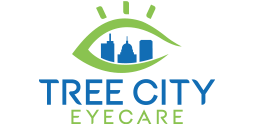With the proper fit and prescription, contact lenses can comfortably provide you clear vision throughout the day. However, they should still be removed before bed or before napping.
You should always avoid sleeping with contact lenses due to the increased risk of eye infections and other complications. Your eyes produce fewer tears when you sleep, which can dry out the lenses and cause them to adhere to your cornea.
At Tree City Eyecare, we offer comprehensive services like contact lens fittings to ensure your lenses match your lifestyle.
Why Sleeping in Contact Lenses Is Risky
Wearing contact lenses overnight can lead to serious eye health issues. Your cornea requires oxygen to stay healthy. However, since the cornea lacks blood supply, it can only receive oxygen from tears and the atmosphere.
Many contact lenses are gas-permeable to allow oxygen through, but they can still limit the flow of oxygen, particularly when your eyes are closed during sleep.
This restricted oxygen flow can create an environment conducive to bacteria and other pathogens, putting your eye and vision health at risk.
Corneal Swelling
When the cornea suddenly can’t receive sufficient oxygen, it may lead to corneal swelling. Your cornea can normally swell when you wake up due to the lack of oxygen, but a healthy eye can quickly and effectively address this swelling.
When you sleep with contact lenses on, the lenses further deprive your cornea of oxygen. Prolonged deprivation may even lead to more severe conditions like corneal ulcers or corneal edema.
Eye Infections
Eye infections, such as keratitis, are common risks of sleeping in contact lenses. Bacteria or other microorganisms trapped under the lens can multiply during sleep.
Keratitis can lead to pain, redness, and even vision loss if not treated promptly. Regular comprehensive eye exams can help detect and prevent such issues early.
Corneal Abrasions
Contact lenses that dry out overnight may adhere to your cornea, causing microscopic tears or abrasions. These can be painful and may create an entry point for infections. Proper contact lens care can significantly reduce this risk.
What to Do If You Accidentally Sleep with Your Lenses
If you accidentally fall asleep with your contact lenses, here’s a step-by-step process of what you should do:
- Remove them as gently as possible. However, the lenses may adhere to your eyes, and tugging the contacts could cause corneal scratches.
- If you can’t easily remove the lenses, apply sterile eye drops or artificial tears to your eyes. After a few minutes, the hydration can typically help release the contact lenses.
- Inspect your eyes and check for redness, pain, or blurred vision. If you notice any unusual symptoms, contact your eye doctor right away.
- Don’t wear contact lenses for at least a day. Allow your eyes ample time to heal.
Are There Exceptions?
Extended Wear Contact Lenses
Some contact lenses are FDA-approved for overnight or extended wear. These lenses are typically made from materials that allow more oxygen to reach the cornea. However, even with extended-wear contact lenses, the risk of complications remains higher compared to removing your lenses daily.
Orthokeratology
Also called Ortho-K, these contact lenses are specially designed to be worn while asleep. Unlike traditional contacts, Ortho-K lenses gently reshape the cornea overnight to address refractive errors, resulting in clearer vision in the morning.
Ortho-K contact lenses can additionally help combat myopia in children.
If you’re considering specialty contact lenses like extended-wear or Ortho-K contact lenses, it’s crucial to consult your optometrist to determine which options best suit your eye care needs.
Proper Contact Lens Care: A Must
Regardless of the type of contact lenses you wear, proper contact lens care and following your eye doctor’s recommendations help prevent complications and risks associated with improper use.
When using contact lenses, make sure you:
- Wash and dry your hands thoroughly before handling your contact lenses.
- Always clean your lenses with fresh cleaning solution, and never reuse old solution.
- Adhere to the recommended replacement schedule for your lenses to prevent wear and tear that may harm your eyes.
- Don’t expose your lenses to water, whether from the tap, the pool, or a shower, as this increases the risk of infection.
- Never use contact lenses past their expiration date. Expired lenses are likely contaminated and can expose your eyes to bacteria.

Benefits of Contact Lenses
Different types of lenses can suit various lifestyles. With proper use and care, contact lenses offer several advantages, including:
- Vision correction: Contact lenses are viable alternatives to glasses, addressing common refractive errors like nearsightedness, farsightedness, and astigmatism.
- Wide field of view: Unlike glasses, contact lenses sit directly on your cornea, correcting your side vision
- Tailored to you: Contact lenses come in various types, offering daily, bi-weekly, and monthly options to suit your lifestyle needs.
The Importance of Contact Lens Exams & Fittings
A professional eye exam and contact lens fitting can help evaluate your eye health and determine which contact lenses suit your needs. Comprehensive evaluations also monitor any changes in your vision to keep your prescription up-to-date.
Tree City Eyecare: Your Source for Contact Lenses
At Tree City Eyecare, we are committed to helping you maintain healthy vision through personalized care and education. Whether you need a routine exam, specialty lenses, or advice on proper lens care, our team is here for you.
Schedule an appointment with us today to ensure your eyes receive the care they deserve. Your vision is our priority!


